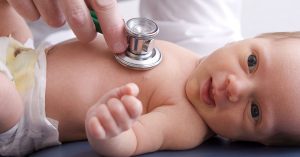
Part of preparing for the arrival of a new baby is deciding on a pediatrician. Newborn babies generally receive their first check-up very soon after they’re born. Newborn screenings are done in the hospital about 24-48 hours after a baby is born. So you want to make sure you have your preferred pediatrician ready to take over after your baby is discharged. Since it’s Newborn Screening Awareness Month in September, now is the perfect time to go over what you can expect in your baby’s first days.
What are the Newborn Screening Tests?
One of the main components of newborn screening is a simple blood test to check for genetic, metabolic, and hormone-related conditions. There is a recommended screening panel for newborns that checks for a long list of health issues.
Some of those issues being screened for during a newborn exam include:
- Hearing loss
- Phenylketonuria (PKU)
- Congenital Hypothyroidism
- Galactosemia
- Sickle cell disease
- Maple syrup urine disease
- Homocystinuria
- Biotinidase deficiency
- Congenital adrenal hyperplasia
- Medium-chain acyl-CoA dehydrogenase deficiency (MCAD)
Heel Stick
The heel stick is used to collect blood for the screening tests. The infant’s heel is warmed and carefully sterilized. Then medical staff put a small puncture in the baby’s heel and squeeze out a few drops of blood onto an absorbent card. The card has circles printed on it that indicate where the blood sample needs to go. They continue the test until all the circles contain a sample. The card is sent to the lab where the blood is tested for the conditions on the newborn screening panel.
Other Blood Tests
Sometimes a second round of blood tests may be necessary. Some states require the first set of screenings to be repeated. The second screening is performed around 10 to 14 days after birth to confirm the results of the first newborn screening.
Pulse Oximetry
Sometime a baby will get a pulse oximetry test to measure how much oxygen is in the newborn’s blood. A sensor is placed on the baby’s skin for a few minutes where it measures the level of oxygen in the blood through the skin. This test is done at least 24 hours after birth.
Hearing Test
There are two methods that can be used to test a newborn’s hearing:
- Otoacoustic emissions (OAE): This test determines if an infant’s ears respond to sound. A miniature earphone and microphone are placed in the ear and sounds are played. If a baby has normal hearing, the microphone will pick up the echo from the ear canal. If there is not an echo, hearing loss may be an issue.
- Auditory brain stem response (ABR): This test measures the brain’s response to sound. Miniature earphones are placed in the ear, and sounds are played. Electrodes are placed on the baby’s head to detect the brain’s response to the sounds.
Make An Appointment
If you have additional questions about newborn screening, call (919) 896-7066 to talk to a team member about making an appointment.
At HealthPark Pediatrics, the health and safety of our staff and patients is our top concern. We are taking steps to ensure that you and your child will be safe while visiting our office. This includes using a separate entrance for sick visits, limiting the number of staff and physicians, observing social distancing guidelines, and offering telemedicine visits.



